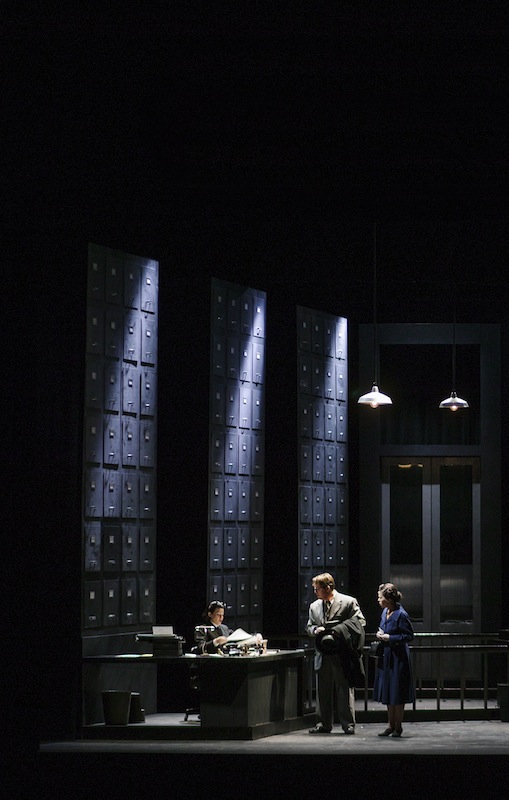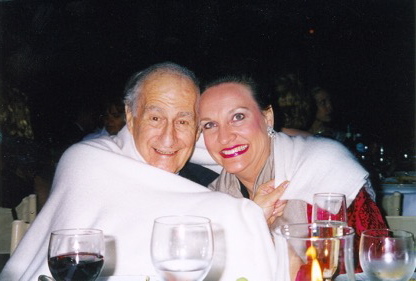Florida Grand Opera to go back to the Cold War future with “The Consul”

Gian Carlo Menotti’s “The Consul” opens Saturday night at Florida Grand Opera. Photo: Tim Fuller/Seattle Opera.
A grim city haunted by secret police. A dissident on the run from the authorities. His wife, attempting to leave the country with their baby, struggles with the staff of a foreign consulate that tortures desperate visa applicants with demands for the proper documents.
The place could be Havana, Beijing or any number of Latin American dictatorships in the 1980s. But the setting of Gian Carlo Menotti’s opera The Consul, which Florida Grand Opera will present May 9-16, is an Eastern European city at the most frigid era of the Cold War, a cold and gloomy place of shadows, gangster-like police and file cabinets full of secrets.
This plot-driven, English-language work contains music that should appeal to anyone who appreciates the lyricism of Italian opera, as well as the edge-of-the-seat drama of a good Broadway play.
“It’s a great bridge for people who love theater and have not been to opera,” said the soprano Kara Shay Thomson, who will sing the lead role of Magda, the wife of freedom fighter John Sorel. “I think it’s a great introduction. It’s real people and amazing orchestration. They’re going to hear full-out scoring, much like movie scoring—lush, gorgeous music.”
The American composer, probably best known for his Christmas family opera Amahl and the Night Visitors, lived an extraordinarily long life (and for much of it as the life partner of the better-known Samuel Barber). When Menotti was born in 1911, Puccini was still alive and composing. By the time he died in 2007, Wicked had entered its fourth season on Broadway.
Growing up in northern Italy, Menotti absorbed the country’s still vibrant operatic culture, studying at the Milan Conservatory before moving to the United States and attending the Curtis Institute of Music in Philadelphia. This musical dual citizenship would serve him well as he learned to combine the lyricism and drama of Puccini with a canny understanding of what would work for American audiences.
Modern opera, a category that for many people can extend to a work premiered 65 years ago, can scare away the public. Listeners who come to the opera house for Mozart, Verdi and Puccini may anticipate entrance into a discordant, melody-free zone that will leave them desperate for the final curtain.
But the opera that FGO will present was a creature of Broadway, not the opera house. After its out-of-town premiere on March 1, 1950 in Philadelphia, The Consul moved to Broadway’s Ethel Barrymore Theater for an eight-month run, winning both the Pulitzer Prize for Music and the New York Drama Critics’ Circle Award for Musical Play.
Operagoers who love the Romantic Italian classics will find many of the same musical values of melody and drama in The Consul. There is a show-stopping aria, Magda’s “To this we’ve come,” as she explodes in frustration at the cold evil of a bureaucratic system that destroys so many lives. The opera is also an eerie ensemble piece involving a magician, Italian woman and the other would-be refugees seeking visas, with many moments that display Menotti’s assured sense of theater.
“It’s not only very compelling and well crafted, but he really could write a melody,” said the conductor Andrew Bisantz, who will lead the performances. “He writes beautiful, soaring lines that an audience comfortable with Puccini will find immediate identification with.
Accessibility can sometimes mean over-simplicity as well. But that is not the case here, says Bisantz. “The Menotti libretto is really very beautiful in spots, but it’s also very cutting in spots as well. And if that isn’t given its due, then the piece gets a little overly melodramatic or a little pat.”
For example, he said, the coldness of the bureaucracy, the world of rules, forms and typewriters, achieves powerful musical expression, as the heroine fights to get in to see the Consul.
“He writes this kind of snide music for the interactions with the secretary,” he said. “There’s that terrific interaction where she says, ‘My name is Magda Sorel,’ and the secretary says, ‘Your name is a number.’ And there’s the idea that here’s this woman, who is really going through the worst period of her life, and she’s met with this absolute coldness and no compassion whatsoever. The way he expressed that musically is pretty terrific.”
For those of us who have never been in as desperate a situation as Magda, this sense of an oppressive bureaucracy can still ring true. We’ve all dealt with health insurance companies, employers, phone and cable companies. We have pressed #4 to be transferred to a representative. We have been forced to find the original receipt–not a copy!—to get paid on an insurance claim. And if this sense of the amorphous, oppressive bureaucracy may be familiar to all of us, the story of an attempt to flee an repressive country should particularly resonate with thousands of people in South Florida.

Composer Gian Carlo Menotti with mezzo-soprano Victoria Livengood at Spoleto Festival. Photo courtesy of V. Livengood
The opera is one of several that FGO general director Susan Danis refers to as “Made for Miami,” works that particularly speak to the culture and historical experiences of the people who make up South Florida’s ethnic mix. She noted that the region is filled with people who fled repression in Cuba, Haiti, and the military dictatorships of the 1970s and 80s of Latin America. In fact, Danis said, they considered changing the setting of the opera to make it speak more overtly to the experience of people in South Florida.
“We had this whole philosophical discussion,” she said. “Could we make this Cuba? We discussed bringing it up to current times or making it in South America. Or could we just make it present day in an unnamed community? But there’s so much in it that references a cold, Eastern European country. And the typewriter is virtually written into the score.”
Julie Maykowski, FGO’s director of artistic administration and head of the Young Artist program, is the stage director for this production. She said she has made a careful study of the opera, said there are indications in the libretto and elsewhere where Menotti carefully considered the moral and political issues raised in the opera to extend well beyond the time and place in which it was set.
“He’s not a man who messed around with words, so if you look of the score, he says it’s set at ‘a time in the present,’ so he did not necessarily see this set in the 50s,” she said. “I don’t think he lightly wrote things like that. I think he knew it was going to be relevant 60 years later. This is a community of exiles and immigrants, and when people see this it’s going to ring true for them.”
Among the cast members is the mezzo-soprano Victoria Livengood, who sings the role of the Mother, who worked extensively with Menotti and knew him well. In rehearsals with the composer, she made many notes in the score, and has been consulted by FGO members during the preparations for this season’s performances.
Among the major points she recalls, was Menotti’s emphasis on the importance of rests, pauses in the music in which no sound is heard. Often these are treated casually, she said, but the composer insisted on drawing them out, almost to a point where they were unbearable, to heighten the drama.
“He wanted the audience to feel uncomfortable,” Livengood said. “He wanted the audience to feel like, when we held our breath, they held their breath, too.”
Florida Grand Opera’s production of Menotti’s The Consul opens 7 p.m. Saturday at the Arsht Center in Miami and runs through May 16. fgo.org; 800-741-1010.
Posted in Articles
2 Responses to “Florida Grand Opera to go back to the Cold War future with “The Consul””
Leave a Comment
Tue May 5, 2015
at 11:51 am
2 Comments







Posted May 10, 2015 at 11:18 am by Michael
Went to the opening night performance, horrible experience!
A very depressing story a dark stage set combined with the ear-piercing cacophony of sounds. This thing might do for a Broadway musical but PLEASE!!! don’t call it an opera. Doing so is highly offensive for the centuries old genre so let it preserve its beauty without the invasion of that ridiculous pretension. If FGO continues this pattern, it would make me think hard about future season subscriptions.
Posted May 13, 2015 at 7:07 pm by booinboston
Michael gripes: a very depressing story. Aren’t many operas depressing and tragic? “The Consul” was interesting,complicated and unexpectedly fresh — free from the dust, cobwebs and traditions that often choke the life out of over-indulged operas. Bravo to Florida Grand’s willingness to stake new turf and build a youthful following.